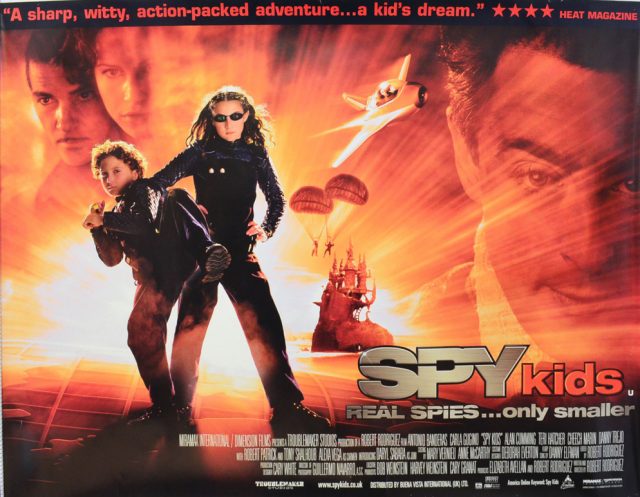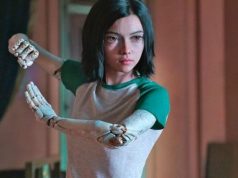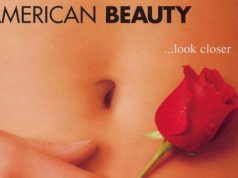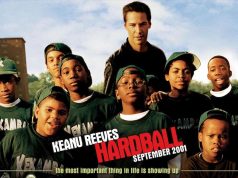
Hard to believe it’s been ten years since Robert Rodriguez abruptly switched from raucously violent fare like “Desperado” and “From Dusk Till Dawn” to the junior-oriented “Spy Kids.” Even harder to believe is how naturally his energies translated to family-friendly adventures. “Spy Kids” was great — or was it???!?!
I sure thought so in 2001!
What I said then:
“‘Spy Kids’ is a wildly inventive kids’ movie that doesn’t pander to its audience, isn’t full of potty humor, and teaches a good message. In other words, it’s a freak of nature…. The film is a child’s fantasy. Carmen and Juni get to fly around with jet packs, pilot a super-fast airplane, and stay up past their bedtime. They prove themselves more adept at spy work than their suave but rusty parents. As characters, Carmen and Juni are a breath of fresh air. They’re savvy and smart, but not obnoxious or precocious. Their interaction is full of sibling rivalry that is often very pointed, but it’s all resolved nicely in the end…. When it’s all said and done, it is intelligence and wit that help the good guys win, not weapons and muscles. Family unity and trust are also played up…. It’s the rare film that is both ‘good’ (i.e., inoffensive and uplifting), and ‘good’ (i.e., well-made). Take the kids and enjoy.” Grade: A- [complete review]
The brand has been diluted by sequels (including Part 4 this week) and Rodriguez’s other kid flicks, “The Adventures of Shark Boy & Lava Girl in 3-D” and “Shorts,” none of which had nearly the same cachet. It’s tempting to think, in hindsight, that the first “Spy Kids” was no great shakes, either. But it genuinely was well-received. It has a 93% Fresh rating on Rotten Tomatoes and an average score of 71 out of 100 at Metacritic, and it made $148 million at the box office worldwide. Most of the reviews weren’t quite as effusive as mine, but still. This isn’t like the time I gave “Pearl Harbor” a B+. (Yeah, yeah, I know. We’ll get to it.)
The re-viewing:
Hey, look! It’s Danny Trejo as a character named Machete, just like in that other Robert Rodriguez movie, “Machete”! I forgot he was in this. Is he supposed to be the same guy? I’m not sure the backstories of this Machete and the “Machete” Machete can exist in the same universe. There might be some flaws in Robert Rodriguez’s world-building.
As for the rest of the movie, it’s still relatively enjoyable, but I’m not nearly as smitten as I was a decade ago. What struck me as “wildly inventive” then — the flashy spy gadgets, the nifty adventures — feels sloppily and haphazardly assembled. Cool inventions pop up from one scene to the next for no better reason, narratively speaking, than that Rodriguez happened to think of them. The junior variation of an elaborate James Bond-style villainous scheme has no logic to it at all. A kid flick can still be considered a “good movie” even when it resorts to that kind of lazy nonsense, of course. But it wouldn’t be singled out as exceptional.
I do like these kids, though. Movie kids are usually smarter (and more smart-alecky) than real children, and movie siblings rarely relate to each other the way actual brothers and sisters do. (I don’t know why that is. You’d think the people who make movies who have siblings themselves would remember what it’s like.) Carmen and Juni interact in a way that’s believable for a 12-year-old girl and her 9-year-old brother. Their squabbles feel authentic. The film’s imaginative gizmos and set designs are good, but I think its best asset — and the one least commonly seen in children’s movies — is the brother-sister relationship at the center of it.
Do I still love this movie?
No, but we’re cool, this movie and I. We’re on good terms. I can imagine watching it with my nieces and nephews once they’re 8 or so and having a good time with it. There’s no question it presents a nice, simple message and works hard to appeal to its audience. What it doesn’t do, however, is transcend the “kids’ movie” category to become something special. Grade: B
— Film.com




